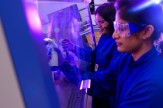So long, trays. Campus eateries get more sustainable

Campus dining halls have undergone a few changes this semester, thanks to student-led efforts to implement two sustainability-focused measures: trayless dining halls and the elimination of single-use plastic bags at Outtakes.
Student organizations have explored these initiatives in recent years and worked closely with Northeastern Dining over the past year to roll out the changes this fall. The Student Government Association and Resident Student Association led the trayless initiative, while the Husky Environmental Action Team pushed for reducing plastic bag use. Trays are still available to students who need them for medical reasons.
“This is a very real and tangible way to have a positive environmental impact on campus,” SGA Executive Vice President Paulina Ruiz said of trayless dining halls, the initiative she led with Jake Grondin, SGA member and former RSA vice president for advocacy. “The data is there, and the student support is there. It’s an initiative by students and for students, all in the name of positive environmental impact.”
The student-led initiatives also align with Northeastern Dining longstanding focus on sustainability.
“We have been engaged in developing our comprehensive Green Plan for over 10 years,” said Maureen Timmons, Northeastern’s director of dining services. “One of our favorite parts of these initiatives is the collaborations with our students on many of our sustainability efforts including local, composting, trayless, and bagless. We look forward to continuing to work with students on our shared commitment to ‘greening’ the Northeastern campus.”
This is a very real and tangible way to have a positive environmental impact on campus.
Paulina Ruiz, SGA Executive Vice President
Last fall, SGA and RSA surveyed about 900 people in the dining halls, asking if they’d be in favor of the university going trayless. They found overwhelming support, and in the spring they worked with marketing students in the D’Amore-McKim School of Business to conduct a more in-depth analysis. The marketing students led a small focus group and an online survey, both of which found that the majority of students support the initiative.
The marketing students also reported “overwhelming evidence” suggesting trayless dining halls have a lesser environmental impact than those using trays. They also cited several outside studies on trayless initiatives: a 2012 study that documented a 32 percent reduction in food waste, as well as a 2008 study that found that removing trays reduced per-person food waste by between 25 and 30 percent. Another study in 2008 calculated a savings of 200 gallons of water a day per 1,000 meals served in trayless dining halls.
Trayless dining halls were piloted during this summer’s freshman orientation, and the measure went into full effect at the start of the fall semester. “We have seen mostly positive feedback,” Grondin said. “People have rallied behind it.”
Meanwhile, the Outtakes initiative is expected to save 200,000 single-use plastic bags in one year, according to Northeastern Dining, which handed out several thousand reusable bags at the start of the semester to help spread awareness of the change. Representatives from HEAT also sent student volunteers to Outtakes during lunch and dinner hours early in the semester to speak with students about the initiative and solicit feedback.
Eliminating plastic bags is one of many ways HEAT is focused on campus sustainability, according to Max Wagner, the group’s current vice president and former president. “Our two main goals are to educate students and advocate for sustainability on campus,” he said.





